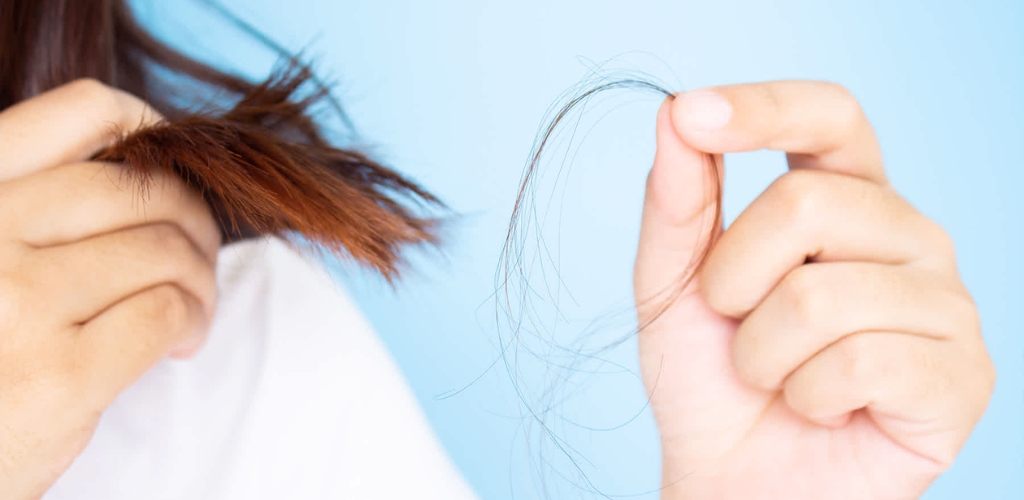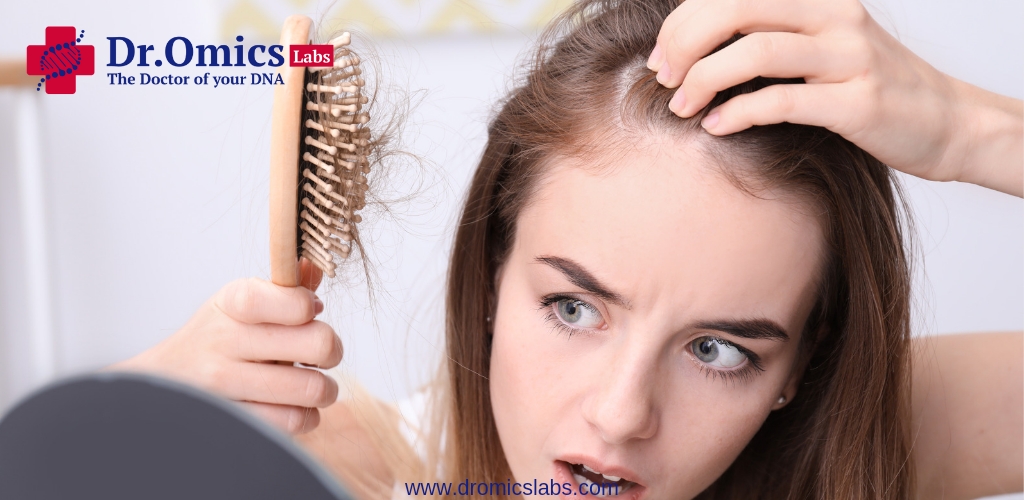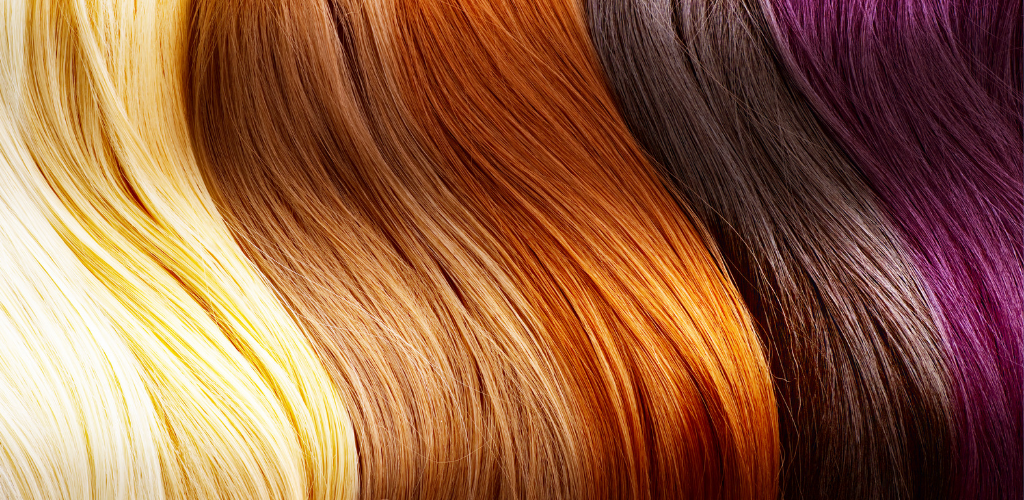Genetic hair loss, also known as androgenetic alopecia, is influenced by hormonal factors that play a significant role in the development and progression of this condition. Understanding the intricate relationship between hormones and genetic hair loss is essential for effective management and treatment. Here’s an in-depth look at the role of hormones in genetic hair loss:
Androgens and DHT Sensitivity
Androgens: Androgens, particularly dihydrotestosterone (DHT), are crucial hormones involved in regulating hair growth. In individuals with genetic predispositions to androgenetic alopecia, an inherited sensitivity to DHT can lead to the shrinking of hair follicles over time.
DHT Sensitivity: Genetic variations can make hair follicles overly sensitive to DHT, causing them to shrink and produce thinner, shorter hair. Eventually, affected follicles stop generating new hair, leading to the characteristic patterns of male-pattern baldness or female-pattern hair loss[2][5].
Estrogen and Hair Growth
Estrogen: Estrogen plays a vital role in hair growth by binding to receptors on hair follicles and promoting the growth phase. Changes in estrogen levels, such as during menopause or after childbirth, can lead to significant hair shedding as follicles enter a resting phase simultaneously.
Thyroid Hormones
Thyroid Hormones: Imbalances in thyroid hormones can disrupt the hair growth cycle, leading to diffuse hair loss or thinning across the scalp. Conditions like telogen effluvium can result from thyroid hormone imbalances, affecting both men and women.
Other Hormones Contributing to Hair Loss
Insulin: High insulin levels in women, often due to insulin resistance or diabetes, can elevate testosterone levels, contributing to hair loss similar to that seen in conditions like polycystic ovary syndrome (PCOS).
Cortisol: Elevated cortisol levels due to chronic stress can impact hair health by prolonging the resting phase of hair follicles, preventing them from regenerating and entering a growth phase.
Understanding how hormones influence genetic hair loss is crucial for developing targeted treatments that address hormonal imbalances and their impact on hair follicles. By recognizing the intricate interplay between hormones and genetic factors, individuals can take proactive steps to manage genetic hair loss effectively.
What are some ways to manage hormonal hair loss ?
Some ways to manage hormonal hair loss include:
- Hormone Therapy: Hormone therapy, especially for women experiencing hormonal hair loss due to postpartum or menopause-related changes, can be effective. This treatment often includes hormone replacement therapy (HRT) to balance hormonal levels, reduce hair loss, and promote new hair growth.
- Medications: Various FDA-approved medications show promise in treating hormonal hair loss. These medications, including supplements and drugs, can help address the underlying hormonal imbalances contributing to hair loss.
- Platelet-Rich Plasma (PRP) Therapy: PRP therapy is a cutting-edge solution that utilises the body’s healing power to stimulate new hair growth. This treatment has shown effectiveness in encouraging hair regrowth for individuals experiencing hormonal hair loss.
- Lifestyle Adjustments: Making lifestyle changes like managing stress levels, maintaining a balanced diet rich in essential nutrients, and avoiding crash diets can positively impact hormonal balance and overall hair health.
- Topical Treatments: Topical treatments applied directly to the scalp can help manage hormonal hair loss effectively. Minoxidil (Rogaine) is an FDA-approved topical treatment that has shown success in stimulating hair growth in women with androgenetic alopecia.
- Bioidentical Hormone Therapy: Bioidentical hormone therapy can help restore hormonal balance and improve hair loss caused by hormonal imbalances. By bringing estrogen and progesterone levels back into equilibrium, this therapy can contribute to reducing hair loss and enhancing hair growth.
- Consulting a Dermatologist: Seeking guidance from dermatologists specialising in hair loss can provide personalised treatment plans tailored to address specific hormonal imbalances contributing to hair loss
What are some natural remedies to promote hair growth ?
Some natural remedies to promote hair growth include:
- Coconut Oil: Coconut oil is rich in vitamin E, fatty acids, and antioxidants, which can help rehydrate the scalp and strengthen hair follicles. Massaging coconut oil into the hair as a nighttime treatment can promote hair growth and improve hair health.
- Rosemary Oil: Rosemary oil has been found to be effective in managing hair loss and promoting new hair growth. Massaging a few drops of rosemary oil into the scalp daily can help soothe the scalp, reduce irritation, and stimulate hair growth.
- Peppermint Oil: Peppermint oil can stimulate hair growth by increasing blood flow to the scalp. Diluting peppermint oil with another carrier oil and massaging it into the scalp can enhance blood circulation, promoting healthier hair growth.
- Red Ginseng: Red ginseng is known for its potential to stimulate hair growth. Incorporating red ginseng into your routine can help improve blood circulation to the scalp, supporting the growth of stronger and healthier hair.
- Aromatherapy with Essential Oils: Essential oils like cedarwood, lavender, rosemary, thyme, and tulsi can be used in aromatherapy to promote hair growth. Inhaling the scent of these oils or applying them topically with a carrier oil may help stimulate hair follicles and encourage new hair growth.
- Scalp Massage: Massaging the scalp helps improve blood flow to the hair follicles, promoting better nutrient delivery and stimulating hair growth. Gentle circular massages using fingertips or specialized scalp massage devices can enhance hair health.
- Healthy Diet: Consuming a balanced diet rich in protein, iron, and essential nutrients is crucial for promoting healthy hair growth. Foods like beans, eggs, fish, nuts, lean meats, seeds, and whole grains provide essential nutrients that support hair health.
- Avoiding Hair Damage: Limiting the use of heat styling tools, harsh chemicals like bleach and relaxers, excess shampooing, and tight hairstyles can prevent damage to the hair shafts and minimise hair loss.
Conclusion :
In conclusion, hormonal factors play a significant role in genetic hair loss, also known as androgenetic alopecia. Understanding the complex interplay between hormones and hair follicles is crucial for effective management and treatment of this condition. Androgens, particularly DHT, estrogen, and thyroid hormones, influence hair growth patterns and can contribute to hair loss when imbalanced. Managing hormonal hair loss involves hormone therapy, medications, lifestyle adjustments, topical treatments, and consulting dermatologists for personalised care plans. Additionally, natural remedies like coconut oil, rosemary oil, peppermint oil, red ginseng, aromatherapy, scalp massage, and a healthy diet can promote hair growth and improve overall hair health.
Citations:
[1] https://onlinelibrary.wiley.com/doi/full/10.1111/exd.14130
[2] https://www.alluredermny.com/blog/hormones-and-hair-loss-understanding-the-link
[3] https://www.alluredermny.com/blog/how-hormones-contribute-to-hair-loss
[4] https://medicover-genetics.com/the-genetics-of-hair-loss-alopecia-and-more/?amp=1
[5] https://medlineplus.gov/genetics/condition/androgenetic-alopecia/




